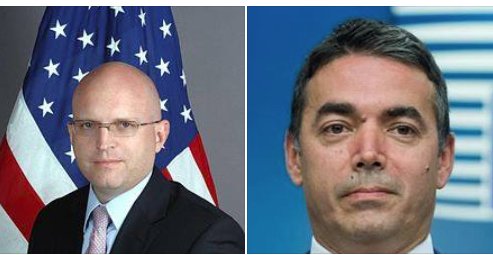died on 26 February 2004 in a plane crash en route to an economic conference in Mostar, Bosnia and Herzegovina. The aircraft crashed in thick fog and heavy rain on a mountainside in southeastern Herzegovina, near the villages of Huskovici and Rotimlja some eight miles (15 km) south-south-east of Mostar. Eight other people were also aboard but none survived the impact, which broke the aircraft into three pieces. It came down in an area that had been heavily mined during the Bosnian War of the 1990s, which significantly hampered the rescue and recovery efforts.
Although the cause of the crash is not known, it seems likely that it was the result of a controlled flight into terrain, possibly exacerbated by alleged mistakes made by the SFOR air traffic controllers at Mostar Ortiješ International Airport.
, Doppel Agent: Nikola Dimitrov, heute Aussenminister, aber abgemeldet bei den Amerikanern, weil er Doppel Agent war.
Oktober 2000 bis November 2001 Sicherheitsberater des mazedonischen Präsidenten Boris Trajkovski.
Er ist wohl der Schlüssel, warum man den Präsidenten Boris Trajkovski ermordete, bei einem merkwürdigem Flug nach Bosnien.
Er ist wohl der Schlüssel, warum man den Präsidenten Boris Trajkovski ermordete, bei einem merkwürdigem Flug nach Bosnien.
Lauter korrupte Idioten entsandten die Amerikaner in den Balkan, was ja lange bekannt ist. der heutige Mazedonische Aussenminister Nikola Dimitrov ein Doppel Agent. Philip Reeker gab die Order die Mazedonischen Regierungs Institutionen abzuhören, spielte alle Gegenseitig aus, mit den kriminellen diversen Botschaftern, wie Whollers, Baely, dem korrpten Steinmeier, der jedes Verbrechen aktiv mit macht. Der korrupte Zoran Zaev, die Georg Soros Tussi: Verteidigungs Ministerin: Radmila Sekerinska, gab dem Land den Rest.
Ein totaler korrupter Idiot. Philip Reeker, heute:
Philip Thomas Reeker (born January 19, 1965) is an American diplomat and career foreign service officer with the Department of State. He currently serves at U.S. European Command (EUCOM) in Stuttgart, Germany as of November 2017

Philip T. Reeker
Philip Reeker, war ein Idiot im Balkan, heute natürlich in einem US Militär Stützpunkt tätig.
How US sabotage unfolded in Macedonia – a summary
– Former US “Ambassador” and CIA operative Philip Reeker (stationed in Italy) ordered the wiretapping of Macedonian Government officials, material later to be used to blackmail officials and MPs.
– Jess Baily on Reeker’s orders recruits current Macedonian Government officials.
– To speed up “regime change” operation, terrorist attack in Kumanovo results in the death of 8 Macedonian policemen.
– CIA through USAid finances underwhelming protests which in the public eye are financed by Soros NGOs, however money came directly from Washington.
– Major electoral fraud and subsequent threats results in the installation of Reeker’s recruits in Government.
– USAid contractor writes “Prespa Agreement”.
– Foreign Minister Nikola Dimitrov, a protected CIA asset approves and signs agreement.
– Referendum fails.
– Reeker instructs Baily to begin with arrests and bribery of MPs to start name change push in Parliament.
– CIA through USAid advises and restructures Macedonia’s judiciary where Reeker’s Special Prosecutor Office (SPO) will become the official and only prosecution office.
http://www.minareport.com/2018/12/16/how-us-terrorism-unfolded-in-macedonia-a-summary/





Keine Kommentare:
Kommentar veröffentlichen